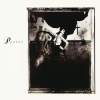
It’s taken a while, but finally Miley Cyrus has given us a song where she sounds like she actually means it! She’s transcended the over-studied pop virtuosity of earlier ‘grown up’ records such as 'Wrecking Ball', she’s tastefully dialled back the parody-Americana character we heard on Mark Ronson’s 'Nothing Breaks Like A Heart' without losing its attractive vocal grain, and suddenly I’m beginning to believe what she’s singing about. Hurray! Given her undeniable work ethic, I’m hoping this is the start of a long purple patch…
While we’re on the subject of her voice, this production also provides some intriguing vocal enhancement effects. Firstly there’s the nice stereo widener, evidence of which you can hear quite clearly if you solo the stereo Sides component during the song’s opening. On first impressions, it sounded to me like the classic micro-shift/delay patch I’ve always associated with the early Eventide Harmonizer and AMS DMX 15-80S outboard units, but that you can now easily get in plug-in form using something like Schwa’s CMX or Soundtoys Microshift. Listening more carefully, though, it sounds like there’s some modulation of the delay time going on, so bear that in mind if you’re wanting to mimic this effect for yourself, as some plug-ins only offer the static-delay variant. That said, I’ve been using the static version on most of my vocals for years, and I’m not personally convinced that the modulation makes a ton of difference in practice.
But I suspect there’s another funky enhancement technique going on here, which is again most audible during the opening section of the song. I say ‘suspect’, though, because (if it’s what I think it is) it’s a trick that’s deliberately designed to give vocals a densely hyper-breathy texture without being audible as distinct or artificial effect. To explain what I think’s going on, I’ve recorded myself singing the first couple of lines of this song, and then applied a good dose of EQ, compression, and micro-shift/delay widener to give it a suitably big and upfront pop sound. Sung Vocal: play_arrow | get_app Next, I rerecorded those same phrases again, but this time pitchlessly whispering them rather than singing them. Now if I high-pass filter the result, remove any noise consonants, and edit the resulting audio to match the rhythms and durations of the sung line as closely as possible, we get this. Whisper Layer: play_arrow | get_app It sounds a bit weird, I’ll grant you, but the magic happens when we mix that whispered track in with the sung vocal, like this. Sung Vocal + Whisper Layer: play_arrow | get_app You get a kind of concentrated breathiness that’s all but impossible to add by means of any kind of processing on the sung vocal, simply because sung vowels don’t contain nearly as rich a noise component as whispered ones do. For example, if I’d tried to create that degree of breathiness by just boosting the high end of the sung vocal (or even compressing it with multiband processing), I’d have ended up overemphasising harsh-sounding noise consonants and upper-spectrum pitched resonances as well.
With this demonstration in mind, now have another listen to the beginning of ‘Flowers’, and I hope you’ll understand why I think it’s using this trick too. What gives it away for me is those few little moments where the whispered layer seems not quite in sync with the sung vocal. At least, that’s how I hear it, but I might be wrong, as I said before. Maybe Miley’s voice really is that breathy…
Another aspect of this track that caught my attention was the fact that although the kick drum has a nice powerful, tight low end with a clearly defined 70ms envelope length, the bass part contributes very little energy below 60Hz. Perhaps this was a means of achieving its -7.5dBLUFS loudness level without excessive distortion, but if so then, frankly, it feels like a bit of a wasted opportunity, and contributes to a mix tonality that feels rather stodgy overall. A telling comparison in this respect is with Lizzo’s 'About Damn Time', which is mastered to -9dBLUFS, so might initially feel underpowered relative to ‘Flowers’. But under loudness-normalised conditions (ie. on almost all streaming services) is has a whole lot more weight to its bass line, as well as generally feeling wider and airier overall.










